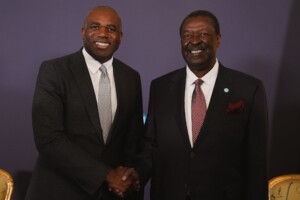Ali Kushayb held by ICC in The Hague for Darfur war crimes
The International Criminal Court (ICC) in the Hague has confirmed that former Darfur janjaweed leader Ali Kushayb, who has been indicted for crimes against humanity, is “in ICC custody”.
 Ali Kushayb in ICC custody in The Hague today (Social media)
Ali Kushayb in ICC custody in The Hague today (Social media)
The International Criminal Court (ICC) in the Hague has confirmed that former Darfur janjaweed leader Ali Kushayb, who has been indicted for crimes against humanity, is “in ICC custody”.
In a press statement this afternoon, the ICC confirmed Kushayb’s detention “after surrendering himself voluntarily in the Central African Republic (CAR)”.
While the ICC will not confirm the exact current whereabouts of Kushayb, reliable sources told Radio Dabanga that after his arrest in the town of Birao in the CAR, just 55km from the Sudanese border yesterday, he was immediately put on board an aircraft bound for the Netherlands.
The ICC statement says that on account of an arrest warrant issued on 27 April 2007, Kushayb is suspected of war crimes and crimes against humanity allegedly committed in Darfur. It says that “the initial appearance Kushayb before the ICC Pre-Trial Chamber II will take place in due course”.
Before and during his trial, Kushayb will in all probability be held in the dedicated ICC Detention Centre which is located within a Dutch prison complex in Scheveningen on the outskirts of The Hague.
Past inmates of the centre include Liberian dictator and war criminal Charles Taylor, former Serbian president Slobodan Milošević, former Bosnian-Serbian president Radovan Karadžić, while Tuareg Islamist Ahmad El Faqi El Mahdi and Malian war crimes suspect El Hassan Ag Abdelaziz currently await trial there.
The warrant of arrest by the ICC against Kushayb lists 50 counts on the basis of his individual criminal responsibility. Kushayb is the first Sudanese ICC suspect to be transferred to the ICC.
As previously reported by Radio Dabanga, on February 11, government negotiators and the Sudan Revolutionary Front rebel alliance agreed during peace talks on the Darfur track in the South Sudan capital of Juba, to hand deposed dictator Omar Al Bashir and the other ICC indictees to the court in The Hague.
On February 22, activists reported that in fear of arrest by the transitional government, Kushayb fled his residence in Rahad El Berdi in South Darfur, accompanied by several armed men, and was seen moving to Um Dafug locality where he crossed the border into the Central African Republic.
In today’s statement, ICC Registrar Peter Lewis thanked the Minister of Justice Flavien M’Bata and the authorities of the Central African Republic, the French Republic, the Republic of Chad, as well as the leaders of the UN Multidimensional Integrated Stabilisation Mission in the Central African Republic (Minusca) and the authorities of the host State, the Netherlands, for their support to the ICC and cooperation in the arrest, surrender and transfer of Kushayb to the Court.

ICC:
Kushayb, Sudanese national born approximately in 1957, was allegedly one of the most senior leaders in the tribal hierarchy in the Wadi Salih locality and member of the Popular Defence Forces (PDF) and allegedly commanded thousands of Janjaweed militia from on or about August 2003 until on or about March 2004. He is alleged to have implemented the counter-insurgency strategy of the Government of Sudan that also resulted in the commission of war crimes and crimes against humanity in Darfur, Sudan. Kushayb is perceived to be the mediator between the leaders of the Janjaweed militia in Wadi Salih and the Government of Sudan. He is also alleged to have enlisted fighters, armed, funded and provided food and other supplies to the Janjaweed militia under his command, thereby intentionally contributing to the above-mentioned crimes. Ali Kushayb is alleged to have personally participated in some of the attacks against civilians namely in the towns of Kodoom, Bindist, Mukjar and Arawala between August 2003 and March 2004, where the killing of civilians, rape, torture and other cruel treatments occurred, therefore he allegedly committed, jointly with others, the above-mentioned crimes.

On 27 April 2007, ICC Pre-Trial Chamber I issued two warrants of arrest, against Ali Kushayb and Ahmad Harun (not in ICC custody). Pre-Trial Chamber I considered that there are reasonable grounds to believe that, (i) from about August 2002, an armed conflict took place between the Government of Sudan including combatants from the Sudan People’s Armed Forces (the Sudanese Armed Forces) and the Popular Defence Force (PDF) along with the Janjaweed militia against organised rebel groups, including the Sudanese Liberation Movement/Army (SLM/A) and the Justice and Equality Movement (JEM) in Darfur, Sudan; (ii) in 2003 and 2004, that the Sudanese Armed Forces and the Janjaweed militia, acting together as part of the counter-insurgency campaign, carried out several attacks, of a systematic or widespread nature, on the towns of Kodoom, Bindisi, Mukjar, Arawala and surrounding areas. In the above mentioned towns criminal acts were allegedly committed against civilians primarily from the Fur, Zaghawa and Masalit populations, such as murders of civilians, rapes and outrages upon the personal dignity of women and girls, persecution , forcible transfers, imprisonment or severe deprivation of liberty, and attacks intentionally directed against the above-mentioned populations.
The warrant of arrest delivered on 27 April 2007 against Ali Kushayb lists 50 counts on the basis of his individual criminal responsibility including:
– Twenty-two counts of crimes against humanity (murder; deportation or forcible transfer of population; imprisonment or other severe deprivation of physical liberty in violation of fundamental rules of international law; torture ; persecution; rape; inhumane acts of inflicting serious bodily injury and suffering ); and
– Twenty-eight counts of war crimes (murder, violence to life and person; outrage upon personal dignity in particular humiliating and degrading treatment; intentionally directing an attack against a civilian population; pillaging; rape; destroying or seizing the property).
Radio Dabanga’s editorial independence means that we can continue to provide factual updates about political developments to Sudanese and international actors, educate people about how to avoid outbreaks of infectious diseases, and provide a window to the world for those in all corners of Sudan. Support Radio Dabanga for as little as €2.50, the equivalent of a cup of coffee.












 and then
and then